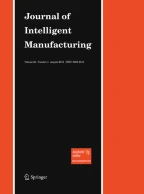Abstract
We propose a tissue characterization method for coronary plaques by using fractal analysis-based features. Those features are obtained from radiofrequency (RF) signals measured by the intravascular ultrasound (IVUS) method. The IVUS method is used for the diagnosis of the acute coronary syndrome. In the proposed method, the fact that the complexity of the tissue structures is reflected in the RF signals is used. The effectiveness of the proposed method is verified through some experiments by using IVUS RF signals obtained from rabbits and human patients.
Similar content being viewed by others
References
Azetsu, T., Uchino, E., Furukawa, S., Suetake, N., Hiro, T., & Matsuzaki, M. (2010). Tissue characterisation of coronary plaques using sparse feature vectors. Electronics Letters, 46(7), 484–485.
Badaloni, S., & Falda, M. (2010). Temporal-based medical diagnoses using a fuzzy temporal reasoning system. Journal of Intelligent Manufacturing, 21(1), 145–153.
Cover, T., & Hart, P. (1967). Nearest neighbor pattern classification. IEEE Transactions on Information Theory, IT–13(1), 21–27.
Duda, R. O., Hart, P. E., & Stork, D. G. (2001). Pattern classification (2nd ed.). New York: Wiley.
Falk, E. (1992). Why do plaques rupture? Circulation, 86(suppl III), III30–III42.
Falk, E., Shah, P., & Fuster, V. (1995). Coronary plaque disruption. Circulation, 92(3), 657–671.
Grassberger, P., & Procaccia, I. (1983a). Characterization of strange attractors. Physical Review Letters, 50(5), 346–349.
Grassberger, P., & Procaccia, I. (1983b). Measuring the strangeness of strange attractors. Physica D: Nonlinear Phenomena, 9(1–2), 189–208.
Hara, A., Ichimura, T., & Yoshida, K. (2005). Discovering multiple diagnostic rules from coronary heart disease database using automatically defined groups. Journal of Intelligent Manufacturing, 16(6), 645–661.
Hiro, T., Fujii, T., & Matsuzaki, M. (2000). Assessment of lipid content of atherosclerotic plaque by intravascular ultrasound using fractal analysis. Journal of the American College of Cardiology, 35(2), 38.
Kawasaki, M., Takatsu, H., Noda, T., Sano, K., Ito, Y., Hayakawa, K., et al. (2002). In vivo quantitative tissue characterization of human coronary arterial plaques by use of integrated backscatter intravascular ultrasound and comparison with angioscopic findings. Circulation, 105(21), 2487–2492.
Kubota, R., Kunihiro, M., Suetake, N., Uchino, E., Hashimoto, G., Hiro, T., et al. (2008). An intravascular ultrasound-based tissue characterization using shift-invariant features extracted by adaptive subspace SOM. International Journal of Biology and Biomedical Engineering, 2(2), 79–88.
Li, X., Shi, D., Charastrakul, V., & Zhou, J. (2009). Advanced p-tree based k-nearest neighbors for customer preference reasoning analysis. Journal of Intelligent Manufacturing, 20(5), 569–579.
Llata, J., Sarabia, E., & Oria, J. (2002). Evaluation of expert systems for automatic shape recognition by ultrasound. Journal of Intelligent Manufacturing, 13(3), 177–188.
Nair, A., Kuban, B., Tuzcu, E., Schoenhagen, P., Nissen, S., & Vince, D. (2002). Coronary plaque classification with intravascular ultrasound radiofrequency data analysis. Circulation, 106(17), 2200–2206.
Nissen, S., & Yock, P. (2001). Intravascular ultrasound: Novel pathophysiological insights and current clinical applications. Circulation, 103(4), 604–616.
Okubo, M., Kawasaki, M., Ishihara, Y., Takeyama, U., Kubota, T., Yamaki, T., et al. (2008). Development of integrated backscatter intravascular ultrasound for tissue characterization of coronary plaques. Ultrasound in Medicine and Biology, 34(4), 655–663.
Puri, R., Worthley, M., & Nicholls, S. (2011). Intravascular imaging of vulnerable coronary plaque: Current and future concepts. Nature Reviews Cardiology, 8(3), 131–139.
Ruelle, D. (1990). Deterministic chaos: The science and the fiction. Proceedings of the Royal Society of London A, 427(1873), 241–248.
Ruschin-Rimini, N., Maimon, O., & Romano, R. (2012). Visual analysis of quality-related manufacturing data using fractal geometry. Journal of Intelligent Manufacturing, 23(3), 481–495.
Saritas, I., Ozkan, I., Allahverdi, N., & Argindogan, M. (2009). Determination of the drug dose by fuzzy expert system in treatment of chronic intestine inflammation. Journal of Intelligent Manufacturing, 20(2), 169–176.
Sathyanarayana, S., Carlier, S., Li, W., & Thomas, L. (2009). Characterisation of atherosclerotic plaque by spectral similarity of radiofrequency intravascular ultrasound signals. EuroIntervention, 5(1), 133–139.
Shah, P. (2003). Mechanisms of plaque vulnerability and rupture. Journal of the American College of Cardiology, 41(4 Suppl S), 15S–22S.
Stary, H., Chandler, A., Dinsmore, R., Fuster, V., Glagov, S., Insull, W, Jr, et al. (1995). A definition of advanced types of atherosclerotic lesions and a histological classification of atherosclerosis: A report from the committee on vascular lesions of the council on arteriosclerosis, american heart association. Circulation, 92(5), 1355–1374.
Takens, F. (1981). Detecting strange attractors in turbulence. In D. A. Rand & L. S. Young (Eds.), Dynamical Systems and Turbulence, Lecture Notes in Mathematics (Vol. 898, pp. 366–381). New York: Springer-Verlag.
Acknowledgments
The authors would like to thank Prof. T. Hiro of Nihon University, School of Medicine, for providing the IVUS data and for his helpful discussion. Many thanks are also due to Mr. Y. Tanaka for his helpful assistance. This work was supported by the Grant-in-Aid for Scientific Research (B) of the Japan Society for Promotion of Science (JSPS) under the Contract No. 23300086.
Author information
Authors and Affiliations
Corresponding author
Rights and permissions
About this article
Cite this article
Uchino, E., Koga, T., Misawa, H. et al. Tissue characterization of coronary plaque by kNN classifier with fractal-based features of IVUS RF-signal. J Intell Manuf 25, 973–982 (2014). https://doi.org/10.1007/s10845-013-0793-3
Received:
Accepted:
Published:
Issue Date:
DOI: https://doi.org/10.1007/s10845-013-0793-3
